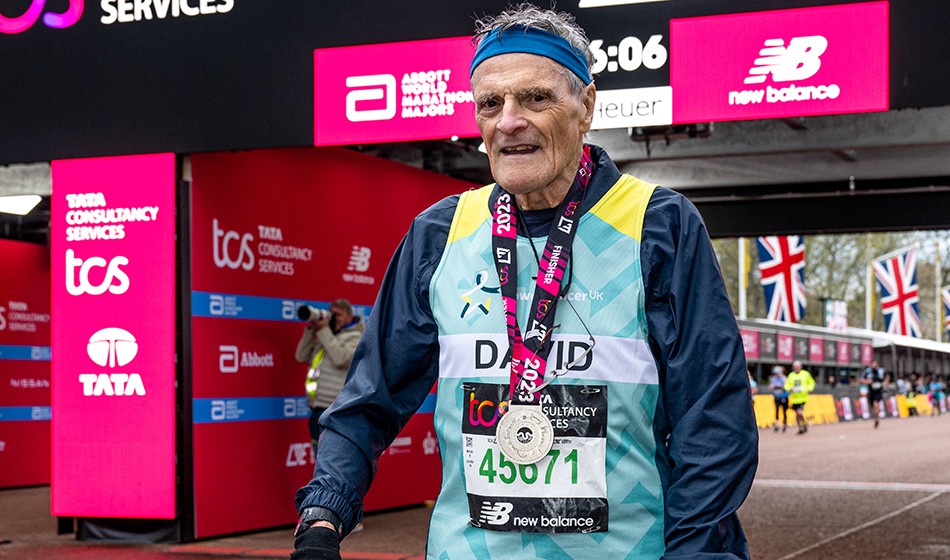The amazing story of marathon veteran David Picksley
Written by I Dig Sports
Meet the 91-year-old who was the oldest finisher at the London Marathon, was in the crowd at Bannisters famous mile and had a sub-four moment of his own
David Picksley is quite a character. For the past couple of years he has been the oldest finisher in the TCS London Marathon. The 91-year-old also had the privilege of watching Roger Bannisters historic sub-four-minute mile live in Oxford 70 years ago.
Whats more, in his first London Marathon back in 1985 he coincidentally ran a sub-four. However, with it being over 26.2 miles it was a sub-four-hour time with 3hr 59min at the age of 52!
A linguist who speaks Russian and French, Picksley lives in south Croydon but spent periods of his early life working in the old Eastern Bloc. Now retired, he has been a carer at home for his wife for the past decade but found some help to enable him to run London again last month, finishing in 7:57:15, despite a mid-event fall that left him with a bloody nose.
At the 2023 London Marathon he raised 9000 for Bowel Cancer UK, with 1000 alone coming from the actress Dame Judi Dench. This year he was hoping to raise a similar amount after marching around the course. He is the first to admit, he walks briskly instead of running, which is understandable given his age.
I started doing a lot of walking in recent years and that was amplified during the pandemic, he explains. I used to go out early in the morning and walk.
Then the London Marathon introduced a virtual marathon and I thought: Well, Ill have a go at that. So I did 7:27 and I thought it was quite good. The following year I did it again in 7:13. So I thought: Why not try get a place in the real race? and I was lucky in the ballot.
David Picksley (LM Events)
In his virtual marathons Picksley created a loop of almost one-and-a-half miles and because it passed his house every lap it meant he could grab water and a banana. Then, in the 2023 London Marathon, he clocked 7:16:46 as the oldest participant.
Picksley was a sprinter at school and used to watch athletes like Sydney Wooderson compete at the White City. But he didnt pursue the sport after university as he got married and started his career in languages where he worked for, among others, Rank Xerox.
He started running more approaching his 50th birthday as he felt he was putting on weight. It also coincided with the 1980s running boom but he couldnt get a place in London initially, so his debut came in Abingdon in 1982.
In 1985 he did his first London Marathon squeezing inside the four-hour barrier and ran in 1990 at the first Berlin Marathon after the wall came down. Three more Londons followed but he thought the 1997 event would be the last, until he came out of running retirement.
David Picksley (right) in 1985
What does he put his longevity down to? I was lucky to be aged six to 12 during the War with rationing, he says. I was eating only good food during that time. It gave me a good start and taught me that this kind of food did me good. You have to have good genes, too. My sister [April] unfortunately died from bowel cancer aged 42 and it could easily have been me.
Picksley feels he has led a fortunate and eventful life. In 1984 he saw Torvill and Dean perform their iconic Bolero ice dance to win Olympic gold in Sarajevo. It came 30 years after being one of the spectators at the first sub-four-minute mile.
Picksley was in Oxford as a student in his first term and remembers: The talk was all about the possibility or, in fact, on the day, rather the impossibility of getting that run done. I used to do quite a lot of my reading in the library at the Oxford Union and over lunchtime there was a lot of talk about the possibility that the three of them would do it.
Due to it being a very windy day they were not sure until they were actually there and the meeting started that they would do it. They thought there was a chance and then they saw a nearby flag flop down a bit and Roger Bannister said: Okay, were going! And they went and it was most exciting, of course.
He adds: The announcement at the end was tremendous because that it was read out as being in a record time for the British record British national record the European and world records of three
There was a huge burst of applause and we didnt hear the rest!
This feature first appeared in the May issue of AW magazine, which you can buy here















 Phone: (800) 737. 6040
Phone: (800) 737. 6040 Fax: (800) 825 5558
Fax: (800) 825 5558 Website:
Website:  Email:
Email: 






